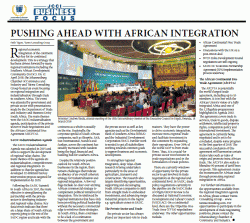Faith Tigere - Pushing Ahead With African Integration2018-11-28 Regional economic integration of the continent is key for its continued development. This is a strategy that
has been driven forward by many regional institutions including the Southern African Development Community (SADC). On 12 April 2018, the Johannesburg Chamber of Commerce and Industry and Tutwa Consulting Group hosted an event focusing on regional integration and industrialisation through trade in southern Africa. The event was attended by government and private sector with presentations made by the Department of Trade and Industry and Business Unity South Africa. The main themes were the SADC industrialisation agenda, participation of the private sector in trade negotiations and the African Continental Free Agreement (AfCFTA). SADC Industrialisation Agenda The SADC Industrialisation Agenda was adopted in 2015 and aims to support the development of regional value chains. The main themes of the agenda are industrialisation, competitiveness and regional integration. In addition to that the agenda has developed 22 different but key intervention projects targeted for implementation by 2020. Following the SADC Summit in South Africa in 2017, the main objective is strengthening the partnership with the private sector in developing industry and regional value chains. Key data trends indicate that there are a large share of South African exports going to the rest of the SADC region and trade with the continent as a whole is steadily on the rise. Regionally, the corporate spread of South African companies, such as Shoprite, SAB, Sun International, Nando’s and Sanlam, across the continent has steadily increased with Sandton being the legal, financial and banking hub for southern Africa. Despite the relatively positive outlook for South African businesses in the region, there remain challenges that indicate an absence of an overall coherent strategy for industrialisation and regional integration. A few red flags include no clear over-arching African commercial strategy to complement political initiatives for integration. This is reinforced by regional institutions that have only been providing political leadership without the necessary commercial edge to reinforce these strategies. In South Africa, there continues to be a lack of coordination between the government and the private sector as well as key agencies such as the Development Bank of Southern Africa (DBSA) and the Industrial Development Corporation (IDC). Further work is needed to get all stakeholders working towards common goals to support business and economic development. To strengthen regional integration, deep value-chain research is being undertaken particularly in the areas of agriculture, transport and construction. The research also targets identifying opportunities, supporting and encouraging South African companies to shift from straight trade to embedded investments, and advancing megaindustrial projects in the region e.g. agriculture zones in SADC. The Private Sector and Trade The private sector has always played an important role in trade matters. They have the power to drive economic integration, increase intra-regional trade and facilitate investment in the continent by expanding their operations. Over 30% of the world GDP is from trade flows. Thus, it is crucial for private sector involvement in trade negotiations and in the formulation of trade policies. There are currently windows of opportunity for the private sector to get involved in trade negotiations at the regional and continental level. In SADC, trade policy negotiations currently in the pipeline are the SADC Rules of Origin (ROO) Review to be discussed at National Economic Development and Labour Council (NEDLAC). On a continental level, there are the Tripartite Free Trade Area (TFTA) negotiations underway. The other opportunities include:
Trade Agreement (AfCFTA) The AfCFTA is potentially the world’s largest trade agreement, including up to 55 members. It is in line with the African Union’s vision of a fully integrated Africa and one of the 12 flagship programmes highlighted in Agenda 2063. The agreement covers trade in services, trade in goods, dispute settlement, intellectual property rights, competition policy and international investment. The agreement is currently being negotiated and is yet to be concluded, despite some progress in the first quarter of 2018. The successful conclusion of this agreement will harmonise certain trades rules such as rules of origin and promote intra-African trade. The AfCFTA also seeks to liberalise 90 percent of tariff lines on goods. This agreement creates the momentum for African trade through promoting regional integration in Africa. For further information on the opportunities available from the regional integration agenda in Africa, please contact Tutwa Consulting Group â€" www.tutwaconsulting.com. For opportunities to participate in the development of trade negotiating positions, please contact the Johannesburg Chamber of Commerce and Industry. |
Faith Tigere - Pushing Ahead With African Integration
Copyright © 2024 KwaZulu-Natal Top Business
